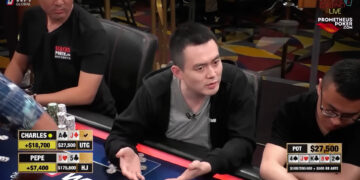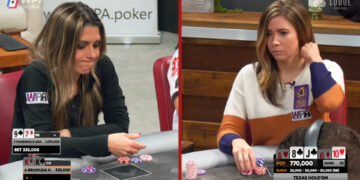I’m not going to beat around the bush. Beating around the bush is not fun. Most of the time. Unless it’s a backup plan. Okay, a little off topic. Let me get straight to the point. You need to know how to tell if someone is bluffing in poker if you want to be good at this game.
Your Radar & Its Impact on Your Game
I’m going to share my current situation on poker tells and how it has impacted my game. Reading poker tells is a game within a game. When you’re on, you win more. When you’re off, you don’t win as much.
Your ability to read someone’s hand is called your radar. Some people have a strong radar, others don’t. For most people, it’s a matter of whether or not their radar is on or not. I’m going to focus on radar for a bit and then get to how to tell if someone is bluffing in poker. I’m going to stick with radar right now because it plays a huge role in our poker rules for winning.
If someone were to ask me if my radar is on right now, I would say it’s at about 78%. This is much better than it had been a few months ago, but it’s not nearly as good as during an eight-month stretch when it was around 95%.
When my radar was on and my reads were on fire, I was at a point where I would open-fold monsters and my opponents would show the nuts. I was also making insane calls. I was in the minds of my opponents.
Nothing could stop me. I think it had a lot to do with clarity and the direction I was going off the felt in life. When that became confusing, my radar faded. It faded all the way down to about 24%.
When my radar faded that low, I began doubting myself. This should be obvious. The problem was that I was doubting myself in the wrong direction. In other words, whenever I wasn’t sure, I was calling instead of folding.
Off the Felt Issues

If I really dig deep into the psychological reasoning for this, it’s because I felt as though I had lost control of certain real life events, which I didn’t like. This, in turn, led to me forcing Ego into the game on the felt because it was another world where I felt like I could be more in control and win.
Little did I know at the time, but this was hurting me, not helping me. Whenever you’re not sure if your opponent has the stronger hand or not, you should lean toward fold. The reasoning for this is simple, and it’s one of the most important poker tips you will read in this article.
Countless studies have shown that when an opponent places a big bet, they usually have it. They don’t always have it, of course, but they tend to have it between 65% and 73% of the time (depending on the study). Of course there is bluffing in poker but if that’s the case, then you’re going to lose if you always lean toward a call.
The following information in the next paragraph is also one of the most important poker tips you will read in this article. The difference is that it’s not something you would expect.
When my game started to come back to me (because I chilled the hell out), I began leaning toward folding. Does this look cool? Absolutely not. But you need to ask yourself an important question, and this question relates to poker strategy: Would you rather look cool or would you rather win?
Folding to Win
I’m going to be honest with you. When you lean toward folding whenever you’re not sure, some of your opponents will see you as a pushover and someone easy to bully. When this happens, they’re going to attempt to steamroll you. If there are strong and observant players at your table, they will also pick up on it and attack.
This might sound like terrible news, but it’s not. One, you’re completely eliminating Ego. Two, since you stopped caring about what other people think, your decisions will feel easy and effortless. Three, whether it’s conscious or subconscious, you’re setting a long-term trap for these players. Let’s take a look at this for a moment before getting to how to tell if someone is bluffing in poker.
Let’s first take traditional poker games, and let’s use 2/5 NL as an example. If you’re sitting there for hours and folding on small pots, that’s smart. You’re cutting your losses early in hands, which is a huge factor for winning in poker and fits within our poker rules for winning. If an opponent has seen you as a pushover for hours and there is a big pot, they’re going to attempt to move you off the hand yet again.
What they almost always fail to realize in these spots is that this is the only time you hung around all the way to the river. There is a reason you did that. It’s because you’re about to take down a massive pot. This happens to me all the time, but you must sacrifice Ego and consistently give up $5, $10, $15 in order to win the $800 pot a few hours later.
Folding to Trap

Now let’s take a look at Texas Hold’em poker tournaments. If there are opponents moving you off hands for hours, it might make you feel small. DO NOT think that way! This is how you should think: I’m making them think I’m small and weak so I can lead them into my den, and I have a chainsaw in my den.
Look at the big picture! If you’re playing in Texas Hold’em poker tournaments, or any poker tournaments for that matter, then the blinds start out low and continue to increase as you move up in levels. This means that all that time your opponent(s) were taking advantage of you, you were losing small pots.
When the pots are bigger, they’re still going to come after you because they think you’re weak, but this is what you want. And this is why it’s correct to lean toward fold when you’re not sure. It keeps you in the game and sets the long-term trap and then show what is the real bluffing in poker..
I can’t tell you how many times people view me as a passive player. I can almost hear them whispering: “That’s him? What’s so special about him?”
A few hours later, they will often find me at the final table. I’m not saying that to brag.
I’m saying (or writing) this because I want you to understand that playing this game of poker by understanding human beings (yourself and others) is a great path to success.
If you understand how people operate and why they do the things they do, then you have a tremendous advantage because you can play off that knowledge in many different ways.
Friendliest Deceptive Person You Will Ever Meet
I know most people don’t believe me when I say/write the following, but it’s pure fact: I am the friendliest deceptive person you will ever meet. It’s kind of like a soft sale (the potential client never knows they’re being sold). I do want you to understand something, though: I’m not maliciously deceptive (unless necessary). I don’t trick people off the felt. I’m transparent and honest.
When it comes to poker and competitive arenas, it’s a different ballgame. But if we grab a beer, I’m chill as they come with no deception whatsoever. I like to think of the scene in Rocky III, when Rocky goes up against Thunder Lips. Thunder Lips won’t shake Rocky’s hand before the match, looks angry, and is ready to crush his competition.
Rocky thinks Thunder Lips is an a**hole. But when the match is over, He shakes Rocky’s hand, smiles, and takes pictures with Rocky. It’s kind of like that, only I’m not 6’7 and I don’t wear a yellow do-rag.
Sometimes I wonder how I veer off course like this, but I only do it if it’s valuable information. We went from how to tell if someone is buffing in poker to Rocky III, but it’s okay. I’ll get there. I promise.
What I’m trying to tell you is that even though my radar isn’t at 95% right now, since I have been leaning toward folding, I have been cashing more. When I was leaning toward call, I barely cashed. Folding keeps you in the game, but you can only pull this off if you tell Ego to go f*ck itself.
How to Tell if Someone is Bluffing in Poker
Fast Bets
I think I missed a call at RunGood Bossier City. I had 55 toward the end of the last tournament and this was the board: AQ322. My opponent showed no interest on the flop, but he bet the turn and river after I checked both streets.
If it was a poker pro, I could see the trap and it would be an easy fold, but this was a Medium Player, and since he was in middle position, I don’t think he would have smashed that turn and river. It’s possible he had a pocket pair, maybe even a full house, but I doubt it. The reason I say that is because he bet the river fast.
Fast Bets = Bluff
When a player bets fast on the river, it’s usually a bluff. I probably shouldn’t tell you that because some of you are my competition, but I’m a generous fellow. As always, put yourself in your opponent’s mind. This is how you find out the answers. Pretend it’s yourself. Why would you bet fast in that situation?
You would bet fast for two reasons. One, you want it to look strong to your opponent. Two, you want to get the situation over with because it’s something that makes you feel unsteady.
My real error on that hand was not jamming pre and then calling the turn. It was a mess. It was probably the worst hand I played the entire trip, even though it wasn’t a big pot. That’s a topic for another time.
The important thing to remember is that fast bets are usually bluffs. Even if they’re not, they’re almost always marginal hands, which means you can raise and steal the pot. If your opponent had a monster, they would pause at least a few seconds to contemplate the right amount to bet to maximize their potential chip extraction.
Slam Bet
This only applies to amateurs that play a lot of poker hands. If an opponent is a LAG amateur player, then they’re going to think they know more about the game and poker strategy than they do.
This is going to lead to them thinking that intimidation tactics will be effective. They might be correct against some opponents, but it won’t be correct against poker pros.
Assuming you’re at least relatively new to the game, if you see a player like this in traditional poker games or poker tournaments and they slam their chips down when they bet, it’s almost always a bluff. They’re trying to scare/intimidate you. That’s a snap-call.
Just keep in mind that this one isn’t universal for how to tell if someone is bluffing in poker.
Long Time to Act
This is a tricky one because it can go both ways. If someone takes a long time to act prior to betting, it’s either a monster or a bluff. There is no in between. I have picked up on a few things to tell the difference, and I’m foolishly going to share them with you.
One, if their eyes are focused (not shifty) while contemplating, it’s a monster. If their eyes are shifty (looking around at different things prior to acting), it’s because they’re accessing the creative side of their mind.
I guess this would be a good time to tell you that I study FBI and military intelligence tactics for reading people. What you learn from these studies can absolutely apply to poker. It can apply to many other things as well.
By the way, even if you know every single clue for how to tell if someone is bluffing in poker, you’re still going to be wrong sometimes. Therefore, if there is a certain poker player in California who is always right, it seems to be a bit too coincidental to me.
Rigidness
If someone’s body is rigid and they are making unnatural movements, they’re bluffing. Simple as that.
Hands Not Shaking
If there is a player at your table that has shaking hands whenever they have a monster, pay careful attention every time they place a big bet. If their hands aren’t shaking, they’re bluffing. Easy as pie.
Story Doesn’t Make Sense
Reading betting patterns is one of the best ways for how to tell if someone is bluffing in poker. For example, if someone raises to $15 pre-flop in a 2/5 NL game, the flop is 722, they fire a c-bet, you float, the turn is a 6, they check, you check (to induce), the river is a 3, and they fire huge, they have ace-high. Call that sh*t!
Staring You Down
This depends on the player. I’ll keep it simple for you. If it’s an amateur doing this, it’s most likely a bluff. If it’s a pro doing this, they’re most likely trying to trick you into calling. Lean toward fold.
Heavy Breathing
For all the ways on how to tell if someone is bluffing in poker, this is one of the toughest to read. You really need to be sitting right next to them. If you do happen to be sitting right next to them, this tell has great value.
If that person’s breathing changes and gets heavier, they’re bluffing. I recommend getting them to talk (be casual). You will usually pick up on whether or not their breathing changed. If they have the hand, nothing with their breathing will change because they’re not concerned about anything.
Final Thoughts
That was a fun. I hope you learned something. As usual, I didn’t go into specific poker hands. I’m more about teaching the game on a psychological level from a macro perspective. Understanding how human beings think plays a huge role in poker because it allows you to crawl inside the minds of your opponents.
If you can get to this place, you will sometimes know what your opponents are going to do before they do it. It’s a great place to be. And remember to lean toward folding. It won’t look cool, but would you rather look cool or win?
♠ pokerjournal.org
Bluffing in Poker – FAQ
What is bluffing in poker?
Bluffing is when you pretend to have a good hand and bet like you do in order to get your opponent to fold. It's an important part of the game.
Why is a bluff in poker called a bluff?
It stems from 19th Century English. It means "to mislead". It also means to "brag or boast".
What is calling a bluff in poker?
This means you called your opponent when he was trying to get you to fold. This will usually be a big pot because most people bet big when bluffing.
How often should you bluff in poker?
Not as much as you think. However, if you're in a passive game, you should bluff often. Otherwise, rarely and only at the right times against the right opponents.


















Discussion about this post